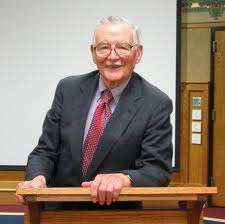Nobel Prize Winning Economist James Buchanan, R.I.P.
- OurStudio

- Jan 9, 2013
- 3 min read
Nobel prize winning economist and public choice economics pioneer James Buchanan is dead, at age 93.
His insights about how the same incentives shape government actors as shape private actors formed a vital part of the modern libertarian worldview.

Here are portions of what I wrote about him in my libertarian movement history, Radicals for Capitalism: A Freewheeling History of the Modern American Libertarian Movement:
In 1986 James Buchanan….earned the [Nobel Prize]. Buchanan's fascination with constitutional rules and procedures, and his apparent belief that any result that comes from them, if they themselves are fairly and properly set up, is normatively acceptable, makes him seem often less than fully libertarian, but he in his own mind had an intellectual project with a moral aspect that inclined him toward respect for the individual and limitation of the power of the state. Whatever the result of arguments over his specific libertarian bonafides, he and his old partner Gordon Tullock, with whom he did the early foundational work in the school of economics that has come to be known as Public Choice, have unquestionably given libertarians a valuable intellectual and ideological tool. Buchanan and Tullock helped build a professional consensus and a rigorous scholarly apparatus around the notion that—despite what many economic professionals used to assume—the behavior of government agents can fruitfully be modeled the same way we model individual behavior in markets; that is, as largely motivated by maximizing the personal utility of the government worker or politician, not some empyrean concept of the "public good" or an overall "social welfare function" that a technical economist could calculate. As Tullock explains it, "the different attitude toward government that arises from public choice does have major effects on our views on what policies government should undertake or can carry out. In particular, it makes us much less ambitious about relying on government to provide certain services. No student of public choice would feel that the establishment of a national health service in the United States would mean that the doctors would work devotedly to improve the health of the citizens."…. The Buchanan/Tullock public choice approach also came to be known as the "Virginia School" of political economy because of Buchanan's formative years teaching at the University of Virginia. (Buchanan had been, unsurprisingly, an economics student at the University of Chicago.) The Volker Fund was one of the early supporters of the Thomas Jefferson Center for Studies in Political Economy and Social Philosophy that Buchanan ran there, and helped them bring in other libertarian thinkers such as Hayek and Italian legal scholar Bruno Leoni for half-year stints. Buchanan sums up the libertarian implications of his research program: "The Virginia emphasis was, from the outset, on the limits of political process rather than on any schemes to use politics to correct for market failures."….
….As with Friedman and Hayek, many were upset that someone with his unpopular libertarian ideology had won the [Nobel] prize. Buchanan understands why his ideological adversaries might object to the "moral passion" at the heart of his political economy: His program "has advanced our scientific understanding of social interaction, but the science has been consistently applied to the normatively chosen question: How can individuals live in social order while preserving their own liberties?"
Steve Horwitz eulogizes Buchanan at Bleeding Heart Libertarians, where he notes:
Understanding public choice theory is indispensable for understanding why good intentions are not enough to make the case for government intervention. If we want to understand why decades of government solutions have not been very successful at improving the condition of the least well off, public choice theory and Buchanan's work is the place to start.
Other interesting bits of Buchaniana: David Henderson reviews Buchanan's memoir Better than Plowing in our January 1993 issue; Edward Younkins wrote a very good tight summation of Buchanan's thought. Iconoclastic economist Bryan Caplan notes how Buchanan admitted his contractarian political philosophy was an attempt to justify a myth.




Comments